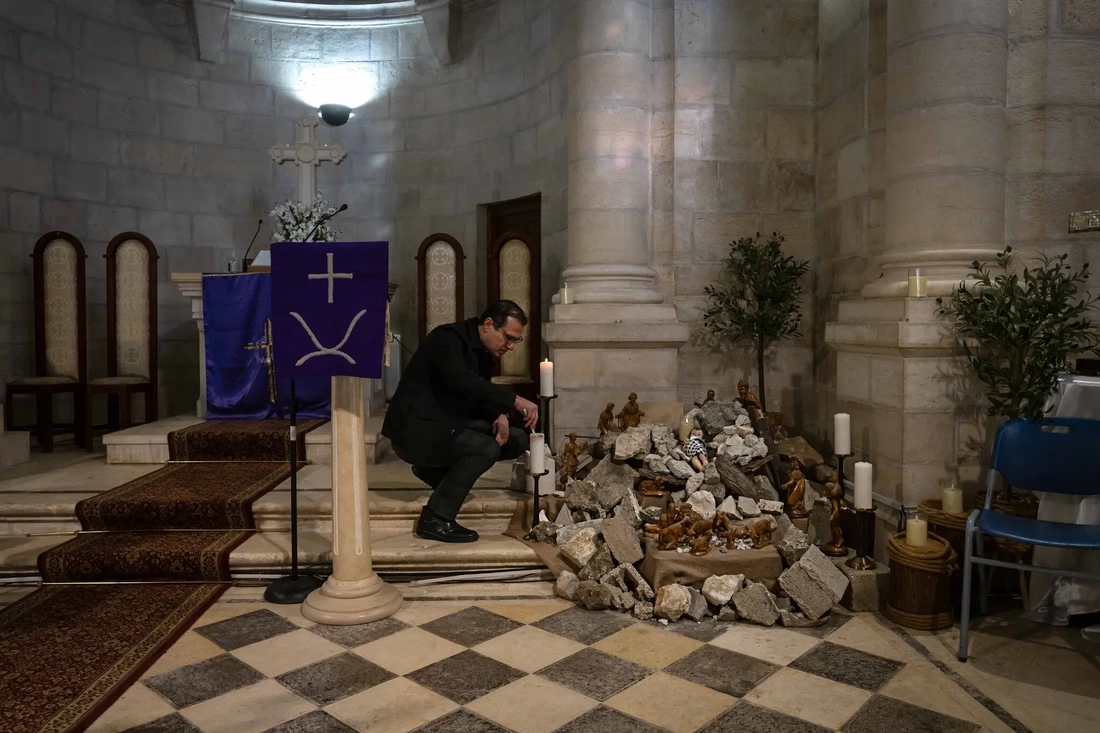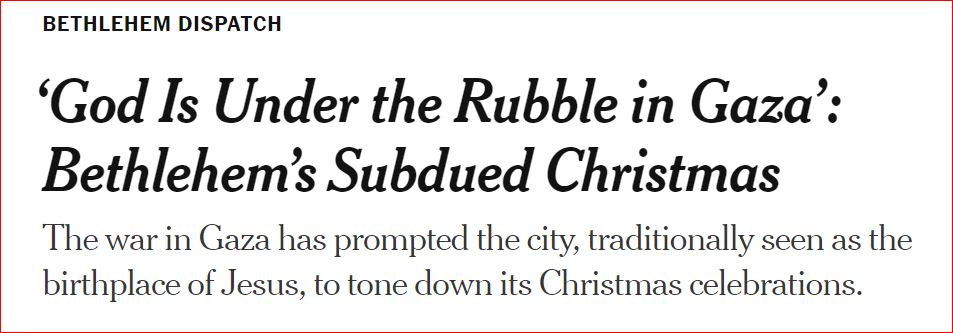- Home
- Process Worldview
- Community
- Art and Music
- Whitehead and Process Thinking
- Podcasts
- Spirituality
- Ecological Civilization
- Education
- Contact
- Social Justice
- Science
- Animals
- Sacred Poems
- Whitehead Videos
- Index of All Titles
- Practicing Process Thought
- Process Spirituality: A Spiritual Alphabet
- Recent Posts
God is in the Rubble,
We are all children of God
“We are sad at seeing all the victims, especially women and children, and we are sad that the international community hasn’t taken serious action to end the massacre, as they did when Russia invaded Ukraine,” said Father Rami Askarieh, the parish priest of Bethlehem’s St Catherine’s church. “We pray each day for Gaza and for the victims of the war on both sides,” he said. “Israelis, Palestinians; we are all human, we are all the children of God.”
"There will be no musical festivities. No tree-lighting ceremony. No extravagant decorations that normally bedeck the West Bank city of Bethlehem at Christmas. With the war in Gaza raging, this is a city in mourning.
In perhaps the most overt display of how Israel’s war in Gaza has dampened Christmas celebrations in the city seen as the birthplace of Jesus, a Lutheran church put up its crèche, but with a sad and symbolic twist. The baby Jesus — wrapped in a keffiyeh, the black-and-white checkered scarf that has become a badge of Palestinian identity — is lying not in a makeshift cradle of hay and wood. Instead, he lies among the rubble of broken bricks, stones and tiles that represent so much of Gaza’s destruction...continue
By Yara Bayoumy and Samar Hazboun, NY Times
Reporting from Bethlehem in the West Bank
Dec. 23, 2023
"A Christmas Carol"
In many parts of the world, although not Bethlehem as I write this, people celebrate Christmas. It is good that we gather together as families; that we sing the songs, enjoy the meals, share the gifts, laugh and tell stories. Festivity and fellowship are the spice of life.
But it is also necessary, morally and spiritually. to keep in mind the headline from The New York Times: "God is under the rubble in Gaza." There will be no music festivities in Gaza. We must not say "Merry Christmas" with too much ease, too much naivete. Ours must be a qualified Merry Christmas, because there is so much that is not merry.
The God who is under the rubble includes babies, young children, elderly people, and many in between. It also includes all in Israel who suffered from the brutality of the terrorist attack, likewise babies, children, and elderly. They are in the rubble together.
We likewise keep in mind those in the rubble of other wars: in Ukraine and Sudan. From the perspective of process theology, God is in all of this rubble. God is not simply up above and away from the world, the rubble in the world - the suffering - is part of God's life.
*
Combined with this, we best remember if any true transformations are to occur in our world, they must be philosophical and structural, spiritual and emotional. Somehow people all over the world, of many faiths and no faith, must come to believe that cooperation is superior to competition, that humility is superior to greed, that forgiveness is superior to resentment, and, of course, that compassion is superior to hatred. Even if we do not like each other, we must learn to co-exist as creatures among creatures on a small and beautiful planet. And we must find ways of organizing our lives - economically and politically - that lend themselves to these, our better angels.
*
Enter Charles Dicken's "A Christmas Carol." At the individual and spiritual level, we must undergo transformations of the heart not unlike the transformation that Ebenezer Scrooge undergoes in "A Christmas Carol." He was obsessed with money and lonely in the process, not unlike the way in which people all over the world, especially in settings that are market-driven and capitalist, are likewise obsessed.
Scrooge discovered, to his shame, that there are many more important things than money: love and familial affection among them. Scrooge responded by giving people more money; we must respond with more than charity. If we are people of power and privilege, we must give up that power and privilege. We must become more like the family in "A Christmas Carol," who lived simply but with love.
*
What can prompt this for us? Suffering itself prompts it. Who cannot be moved by the suffering of those in the rubble and their loved ones? Something else that can move us is the preciousness of life itself, as illustrated for example in infants and their innocence, and in unregulated feelings of affection. The innocence of the Cratchit family who are so kind to one another and the innocence of the young son, Tiny Tim, who is innocent but cheerful, and who says at the end, "God Bless Us. Everyone."
Who is everyone? It is all of us. This means that Christmas must become, for us, communitarian not isolationist. It is not enough that families gather together around Christmas trees and share presents; it is only enough if we, those families, find within ourselves the realization that our own nuclear and extended families are part of, not apart from, other families, nearby and far away, and that they deserve as much respect as we do.
*
Our celebrations cannot take the form of saying "We are so blessed." They must take the form of saying "How can we be blessings to others?" This means, for many of us, giving up our privilege and power. Only then can the innocence of the Christ child and the warmth of familial affection be inclusive.
The hope of Christmas is that we become the kinds of people, transformed like Scrooge, who help build communities that are compassionate, creative, inclusive, participatory, humane to animals, and good for the earth - with no one left behind. And that these communities are welcoming of others, not insulated within themselves: welcoming of immigrants, for example, and people who suffer. No walls.
*
None of this will raise the ghosts from the dead in a literal way. Part of God will always be in the rubble. But it will give meaning to their lives because we are changed and live differently. Because we know that our own hearts are also in the rubble, lest we take the holiness of a baby lying in a manger and turn it into sleeves-rolled-up love in the world.
- Jay McDaniel
A Christmas Carol:
Scholarly Discussion
A Christmas Carol
In Our Time
Melvyn Bragg and guests discuss Charles Dickens' novella, written in 1843 when he was 31, which has become intertwined with his reputation and with Christmas itself. Ebenezer Scrooge is the miserly everyman figure whose joyless obsession with money severs him from society and his own emotions, and he is only saved after recalling his lonely past, seeing what he is missing now and being warned of his future, all under the guidance of the ghosts of Christmases Past, Present and Yet To Come. Redeemed, Scrooge comes to care in particular about one of the many minor characters in the story who make a great impact, namely Tiny Tim, the disabled child of the poor and warm-hearted Cratchit family, with his cry, "God bless us, every one!"
With
Juliet John, Professor of English Literature and Dean of Arts and Social Sciences at City, University of London;
Jon Mee, Professor of Eighteenth-Century Studies at the University of York;
Dinah Birch, Pro-Vice-Chancellor for Cultural Engagement and Professor of English Literature at the University of Liverpool
Producer: Simon Tillotson
LINKS AND FURTHER READING
CONTRIBUTORS
Dinah Birch at the University of Liverpool
Jon Mee at the University of York
Juliet John at City, University of London
READING LIST
Brandon Chitwood, ‘Eternal Returns: A Christmas Carol’s Ghosts of Repetition’ (Victorian Literature and Culture, vol. 43, no 4, 2015)
Paul Davis, The Lives and Times of Ebeneezer Scrooge (Yale University Press, 1990)
Charles Dickens, (ed. Robert Douglas-Fairhurst), A Christmas Carol and Other Christmas Books (Oxford University Press, 2006)
Robert Douglas-Fairhurst, Becoming Dickens (Harvard, 2011)
Sergei Eisenstein (ed. Jay Leyda. Harcourt, Film Form: Essays in Film Theory (Mariner Books, 1969), especially ‘Dickens, Griffith, and the Film Today’
Fred Guida, A Christmas Carol and Its Adaptations (McFarland & Company, 2000)
Audrey Jaffe, ‘Spectacular Sympathy: Visuality and Ideology in Dickens’s Christmas Carol’ (PMLA, vol. 109, no. 2, 1994)
Juliet John, Dickens and Mass Culture (Oxford University Press, 2010)
Juliet John, Dickens’s Villains: Melodrama, Character Popular Culture (Oxford University Press, 2001)
Sally Ledger and Holly Furneaux (eds), Charles Dickens in Context (Cambridge University Press, 2011)
John Leech (ed.), The Annotated Christmas Carol (Norton, 2003)
Robert Patten et al, The Oxford Handbook of Charles Dickens (Oxford University Press, 2018)
Michael Slater (ed.), A Christmas Carol and Other Christmas Writings (Penguin Books, 2003)
Grahame Smith, Dickens and the Dream of Cinema (Manchester University Press, 2014)
Claire Tomalin, Charles Dickens: A Life (Viking, 20011)
RELATED LINKS
‘Ghosts in A Christmas Carol’ by John Mullan – British Library
A Christmas Carol – Wikipedia






